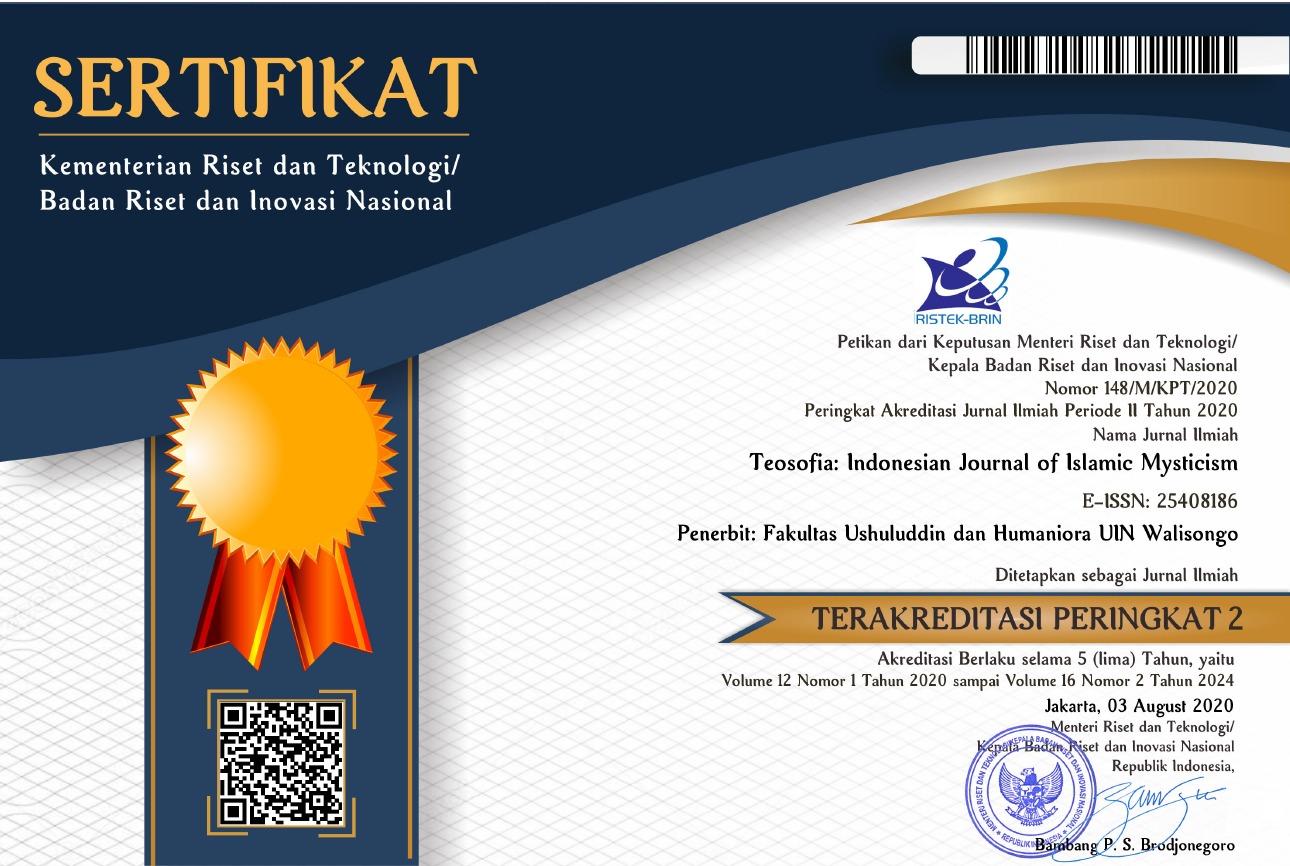CONTESTING ISLAMIC SPIRIT AND ISLAMIC FORMALIZATION: GUS DUR PERSPECTIVES
DOI:
https://doi.org/10.21580/tos.v9i1.5369Keywords:
Islam, spirit, formalization, Gus DurAbstract
In today’s context, Islamic values seem to be allied from Moslem’s life, but the symbol of formal Islam looks always presented in many representations, as well as the people of politic and economic’ world are always using Islamic symbols to direct public opinion. The reason is probably due to religious symbol becomes one of the most effective determinants in this regard. These actual facts are contradicted with the idea of Islam formulated by Gus Dur. He has proposed the idea of Islamic Spirit. That’s why? I would like to propose two questions: what is the contextual meaning of Gus Dur's thoughts about Islamic Spirit, and what if the idea is juxtaposed to the emergence of extreme Islamic thought. For this sake, I use critical-analysis method. The result has shown that the context of Gus Dur’s thought was the emergence of the idea of formalizing Islamic Sharia into the constitutions of the state, Indonesia, after the fall of Soeharto’s new order. Then, Gus Dur tried to countering these new ideologies of Islamic formalization. Islam, based on Gus Dur perspective, is encouraging people to be performing any good deed. To be a good Muslim, someone has no need to do good deed in the name of Islam, but he could be enough having a humanism visions. Therefore, there is no need to formalizing IslamDownloads
References
Abidin, Zainal. “Pemikiran Abdurrahman Wahid Tentang Islam Dan Pluralitas.” Humaniora 3, no. 2 (May 1, 2012): 373. https://doi.org/10.21512/humaniora.v3i2.3332.
Agustinus, D. Buku Tahunan Perfilman, Pertelevisian, Fotografi. Jakarta: Kementerian Kebudayaan dan Pariwisata RI, 2002.
Al-Munawar, Said Agil Husin. “Kata Pengantar: Islam Dalam Konteks KeIndonesiaan: Beberapa Soal Yang Segera Dirumuskan”.” In Masykuri Abdillah, et.Al, Formalisasi Syariat Islam Di Indonesia: Sebuah Pergulatan Yang Tak Pernah Tuntas. Jakarta: Renaisan, 2005.
Anwar, M. Zainal. “Formalisasi Syari’at Islam Di Indonesia: Pendekatan Pluralisme Politik Dalam Kebijakan Publik.” Millah 10, no. 2 (February 23, 2011): 191–212. https://doi.org/10.20885/millah.vol10.iss2.art1.
Crateau, David, and William Hoynes. Media/Society; Industries, Images, and Audiences. London: Pine Forge Press, 2000.
Dey, Ian. Qualitative Data Analysis. New York: RNY, 1995.
El-Fadl, Khaled Abou. Atas Nama Tuhan, Dari Fikih Otoriter Ke Fikih Otoritatif. Translated by R Cecep Lukman Yasin. Jakarta: Serambi, 2004.
Fitriah, Ainul. “Pemikiran Abdurrahman Wahid Tentang Pribumisasi Islam.” Teosofi: Jurnal Tasawuf Dan Pemikiran Islam 3, no. 1 (October 7, 2015): 39. https://doi.org/10.15642/teosofi.2013.3.1.39-59.
Franz Magnis Suseno. Kebangsaan, Demokrasi, Pluralisme: Bunga Rampai Etika Politik Aktual. Jakarta: Kompas, 2015.
Haikal, Muhammad Husein. Sejarah Hidup Muhammad. Jakarta: Intermasa, 1992.
Hall, Stuart Hall, and etal, eds. Culture, Media, Language. London: Hutchinson, n.d.
Huntington, Samuel. The Third Wave: Democratization in the Late Twentieth Century. Norman: University of Oklahoma Press, n.d.
Irianto, Agus Maladi. “KOMODIFIKASI BUDAYA DI ERA EKONOMI GLOBAL TERHADAP KEARIFAN LOKAL: Studi Kasus Eksistensi Industri Pariwisata Dan Kesenian Tradisional Di Jawa Tengah.” Jurnal THEOLOGIA 27, no. 1 (October 8, 2016): 212. https://doi.org/10.21580/teo.2016.27.1.935.
Khasanah, Faizatun”. “Awareness of Islamic Feminism: Learning From Gus Dur and Husein Muhammad.” At-Tahrir: Journal of Islamic Thought 19, no. 2 (n.d.). https://doi.org/https://doi.org/10.21154/altahrir.v19i2.1743.
———. “Revitalisasi Spirit Pemikiran Etika Gus Dur.” Analisis: Jurnal Studi Keislaman 19, no. 1 (June 30, 2019): 27–54. https://doi.org/10.24042/ajsk.v19i1.3062.
Mahfud, Muhammad. “Membumikan Konsep Etika Islam Abdurrahman Wahid Dalam Mengatasi Problematika Kelompok Minoritas Di Indonesia.” Tafáqquh: Jurnal Penelitian Dan Kajian Keislaman 6, no. 1 SE-Article (August 14, 2018). http://jurnal.iaibafa.ac.id/index.php/tafaqquh/article/view/129.
Mibtadin. “Humanisme Dalam Pemikiran Abdurrahman Wahid, Thesis.” UIN Sunan Kalijaga, 2010.
Moleong, Lexy J. Metodologi Penelitian Kualitatif. Bandung: PT. Remaja Rosdakarya, 2009.
Naim, Ngainun. “Abdurrahman Wahid: Universalisme Islam Dan Toleransi.” KALAM 10, no. 2 (February 13, 2017): 423. https://doi.org/10.24042/klm.v10i2.8.
“No Title,” n.d. https://www.nu.or.id/post/read/33004/formalisasi-syariat-mungkinkah.
Rahman, Fazlur. Islam. Chicago: University of Chicago Press, 1979.
Ridwan, Nur Khalik. Gus Dur Dan Negara Pancasila. Yogyakarta: Tanah Air, 2010.
Sa’id, Muhammad al-Asymawi. Shari’a: The Codification of Islamic Law. Oxford: Oxford University Press, 1998.
Siswayanti, Novita. “REVIEW BUKU: SYARAH KONSTITUSI UUD 1945 DALAM PERSPEKTIF ISLAM.” HUNAFA: Jurnal Studia Islamika 10, no. 2 (December 15, 2013): 381. https://doi.org/10.24239/jsi.v10i2.37.381-398.
Syah, Hakim. “Dakwah Dalam Film Islam Di Indonesia: Antara Idealisme Dakwah Dan Komodifikasi Agama.” Jurnal Dakwah XIV, no. 2 (2013). https://doi.org/https://doi.org/10.14421/jd.2013.14206.
Syahputra, Iswandi. “AGAMA DI ERA MEDIA: Kode Religius Dalam Industri Televisi Indonesia.” ESENSIA: Jurnal Ilmu-Ilmu Ushuluddin 17, no. 1 (April 1, 2016): 125. https://doi.org/10.14421/esensia.v17i1.1283.
Tanya, Bernard L. et.al. Teori Hukum: Strategi Tertib Manusia Lintas Ruang Dan Generasi. Yogyakarta: Genta Publishing, 2010.
Taufik, H M, and Amalia Taufik. “Hijrah and Pop Culture: Hijab and Other Muslim Fashions Among Student In Lombok, West Nusa Tenggara.” Teosofia: Indonesian Journal of Islamic Mysticism: Indonesian Journal of Islamic Mysticism 8, no. 2 (2019).
Ulum, Miftachul. “Modernization and Commercialization of Religious Tourism on Reduction of Piwulang Values of Sunan Drajat Lamongan”.” Teosofia: Indonesian Journal of Islamic Mysticism 8, no. 1 (2019).
Wahid, Abdurrahman. Islamku, Islam Anda, Islam Kita: Agama Masyarakat Negara Demokrasi. Jakarta: The Wahid Institute, 2006.
———. Islamku Islam Anda Islam Kita. Jakarta: The Wahid Institute, 2006.
———. Pergulatan Agama, Negara Dan Kebudayaan. Depok: Desantara, 2001.
———. Tabayun Gus Dur. Yogyakarta: LkiS, 1998.
Zaenurrosyid, A, and Lucy Zulies Ulfiana. “Komodifikasi Agama Dalam Islamic Torism Dan Aktifitas Ekonomi.” Jurnal Islamic Review V, no. 1 (2016). https://doi.org/https://doi.org/10.35878/islamicreview.v5i1.106.
Downloads
Additional Files
Published
How to Cite
Issue
Section
License
Copyright
The copyright of the received article shall be assigned to the journal as the publisher of the journal. The intended copyright includes the right to publish the article in various forms (including reprints). The journal maintains the publishing rights to the published articles. Therefore, the author must submit a statement of the Copyright Transfer Agreement.*)
Licensing

This work is licensed under a Creative Commons Attribution-ShareAlike 4.0 International License.
In line with the license, authors are allowed to share and adapt the material. In addition, the material must be given appropriate credit, provided with a link to the license, and indicated if changes were made. If authors remix, transform or build upon the material, authors must distribute their contributions under the same license as the original.
_______
*) Authors whose articles are accepted for publication will receive confirmation via email and send a Copyright Transfer Agreement.









